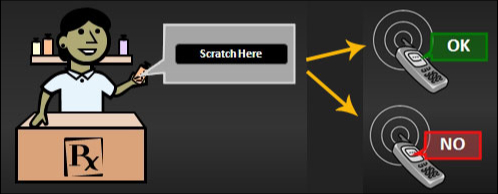Using the lowly text message to fight counterfeit drugs

The global counterfeit drug market is growing like wildfire. Stories about confiscated counterfeit drug caches are becoming commonplace in the news here in the U. S. As bad as the situation is becoming in North America, it has long been a major problem in developing companies. The dangers to those buying counterfeit pharmaceuticals thought to be legitimate are tremendous. To help in the fight against them, mobile technology is being used in some African nations to combat the spread of these counterfeit drugs using simple text messages.
The Mobile Product Authentication (MPA) platform by Sproxil, Inc. is simple in design yet effective in warning consumers in developing countries if the drugs they are buying are legitimate or not. The buyer scratches off a spot on the drug packaging revealing a code that is texted to the drug company's number indicated on the goods. The code is instantly checked against the company's records and a text message is returned to the prospective buyer confirming if the drug is legitimate.
The technology has become effective at fighting the purchases of counterfeit drugs. According to the CEO of BIOFEM Pharmaceuticals, Nigeria's largest drug retailer who distributes Glucophage on behalf of Merck Serono, Sproxil's technology is considered the standard for Glucophage in Nigeria. Consumers have been educated and no one will buy Glucophage without the Sproxil label now.
This is a simple but effective method to protect consumers from dangerous counterfeit drugs. Such drugs are now showing up world-wide due to the giant profits they can generate in a relatively short time. It's nice to see the old-school text message playing such a pivotal role in the fight against them.
